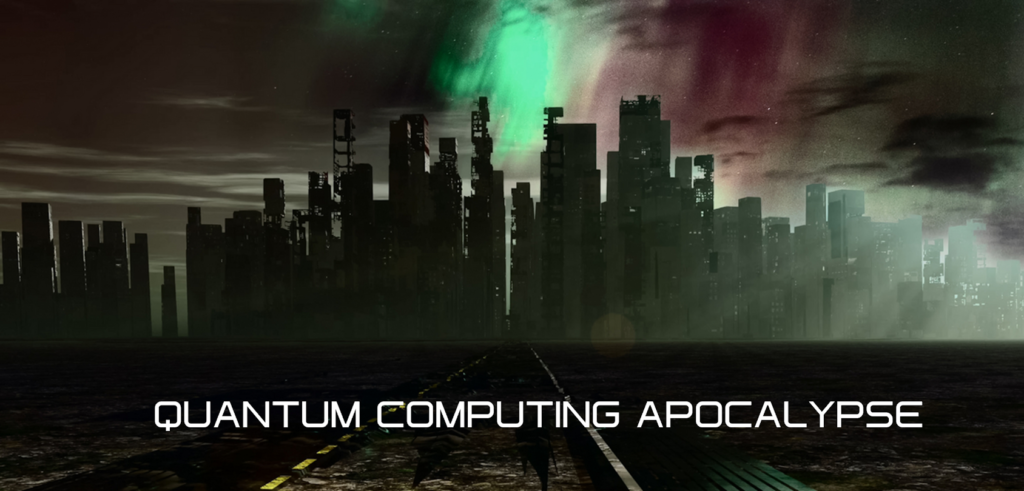According to the Oxford Languages Dictionary, an apocalypse is “the complete final destruction of the world, as described in the biblical book of Revelation” or “an event involving destruction or damage on an awesome or catastrophic scale.” Either definition is bad. With so many pundits predicting that quantum computing is going to be the next big computing breakthrough, should it concern us that some experts are concerned it will also usher in an apocalypse? For example, tech journalist Hope Corrigan (@Hope_Corrigan) warns, “The qubits of the apocalypse shall ride! Maybe!”[1] Take a deep breath. Before we discuss the potential end of the world, let’s look at the current state of play when it comes to quantum computing.
Quantum Computing: Where We Stand Now
Journalist Jasmine Teng (@JasmineLTeng) writes, “In science fiction, quantum computing is often the magic behind time travel machines or alternate universes. But in real life, it could be the next big thing in computing. … Governments, corporations, and venture capitalists are pouring billions into developing the tech. Venture capitalists funneled $1.5 billion into quantum startups in 2021, more funding than the previous three years combined.”[2] Entrepreneur and educator Steve Blank (@sgblank) reports, “Tens of billions of public and private capital are being invested in Quantum technologies. Countries across the world have realized that quantum technologies can be a major disruptor of existing businesses and change the balance of military power. So much so, that they have collectively invested ~$24 billion in in quantum research and applications.”[3] He adds, “A week doesn’t go by without another story about a quantum technology milestone or another quantum company getting funded. Quantum has moved out of the lab and is now the focus of commercial companies and investors.”
According to Blank, quantum computing remains in its nascent state. “In time,” he writes, “quantum computing could obsolete existing cryptography systems, but viable commercial applications are still speculative. … Quantum computers could potentially do things at speeds current computers cannot. Think of the difference of how fast you can count on your fingers versus how fast today’s computers can count. That’s the same order of magnitude speed-up a quantum computer could have over today’s computers for certain applications.” As I have noted before, when someone uses the word “potential” or “potentially” it often means there may not be much to crow about at present. The dictionary defines potential this way: “having or showing the capacity to become or develop into something in the future.” Potential refers to a future state rather than the present state. As Blank notes, “When you remove all the marketing hype, the only type [of quantum computer] that matters is a Universal Quantum Computer. And we’re at least a decade or more away from having those.” Does that mean we can expect an apocalypse a decade from now?
The Quantum Computing Apocalypse
It appears that the so-called quantum computing apocalypse focuses in one area: cryptography. Blank writes, “[Quantum computing] algorithms might have commercial potential one day, no one has yet to come up with a use for them that would radically transform any business or military application. Except for one — and that one keeps people awake at night. It’s Shor’s algorithm for integer factorization — an algorithm that underlies much of existing public cryptography systems.” Tech writer Ash Heptinstall adds, “Imagine a world where secret encrypted files are suddenly opened and exposed — a phenomenon known as ‘quantum apocalypse’.”[4]
Looking to the day when a Universal Quantum Computer is developed, Corrigan writes, “When that leap does eventually come, it’s going to be staggeringly huge and many of our currently secure digital processes will be immediately vulnerable to this technology. Encryption that could take decades to crack on current hardware may take seconds with quantum computing, no matter how great your passwords.” Another concern, according to journalist Kate Samuelson, is the potential negative impact on the global economy. With so many countries now considering issuing or accepting cryptocurrencies, she says those systems would be vulnerable. She explains, “The quantum apocalypse could mark the end of cryptocurrencies like bitcoin, as it would make the blockchain network — which is considered to be pretty much hack-proof — insecure.”[5]
Justin Malonson (@JustinMalonson), founder of Lyfeloop and CEO of Coastal Media Brand, reports that efforts are underway to try and prevent the quantum computing apocalypse. He writes, “DARPA (Defense Advanced Research Projects Agency) has set out grand challenges for computer science with a hefty $2 million prize. DARPA’s goal is to keep U.S. cyber strength relevant amid the rapid decline in Moore’s Law and potential loss of global technological leadership. If quantum computers proliferate, they will threaten everything — not just bank records and medical documents, but everything. They represent a security leak so fundamental that it could be worse than the apocalypse. The quantum computer poses a possible threat to the infrastructure of the United States.”[6] And Ibrahim Almosallam, a consultant in the Research and Innovation Department at SITE, reports there are similar efforts elsewhere. He writes, “The NIST’s post-quantum cryptography competition and EU’s OpenQKD projects are great examples of putting standards and agreements in place to pave the way for a quantum-secure future.”[7]
Concluding Thoughts
Almosallam concludes, “It is hard to underestimate the power of quantum computers.” He adds, “Even if the threat is still far away in the future, preparation has to start now because an adversary can store encrypted data today, then retroactively decrypt once the technology is mature enough. … It is hard to imagine the success of such technologies without strong regulations and governance policies. Can you imagine a world without electricity regulations, internet protocols and fire safety standards? However, even though the risks of quantum computers are well understood, little has yet been done to mitigate them due to the unclear horizon as to their future.” The next decade will fly by. A global approach to governing quantum computing needs to be put in place before an apocalypse can emerge.
On the other hand, we cannot dismiss the tremendous upside of a Universal Quantum Computer. Samuelson explains, “There is hope that the sophistication of quantum computers could enable scientists to design new chemicals, paving the way for advanced medicines and materials. It could also help weather forecasts and stock trades, and even combat global heating.” A few years ago, the very possibility of building a quantum computer remained in doubt. It was just a theoretical possibility. Today, it seems almost certain a Universal Quantum Computer will be built. We need to be ready.
Footnotes
[1] Hope Corrigan, “Experts are warning of a ‘quantum apocalypse’,” PC Gamer, 3 February 2022.
[2] Jasmine Teng, “The state of quantum computing,” Quartz, 31 January 2022.
[3] Steve Blank, “The Quantum Technology Ecosystem – Explained,” Steve Bank Blog, 22 March 2022.
[4] Ash Heptinstall, “What is a quantum apocalypse and is there cause for concern?” The Indie Toaster, 30 January 2022.
[5] Kate Samuelson, “What is the quantum apocalypse?” The Week, 1 February 2022.
[6] Justin Malonson, “Quantum Computing Threatens Everything — Could it be Worse Than the Apocalypse?” Entrepreneur, 28 January 2022.
[7] Ibrahim Almosallam, “Quantum computing will change the cyber landscape, here’s why we need proper governance,” World Economic Forum, 28 February 2022.





